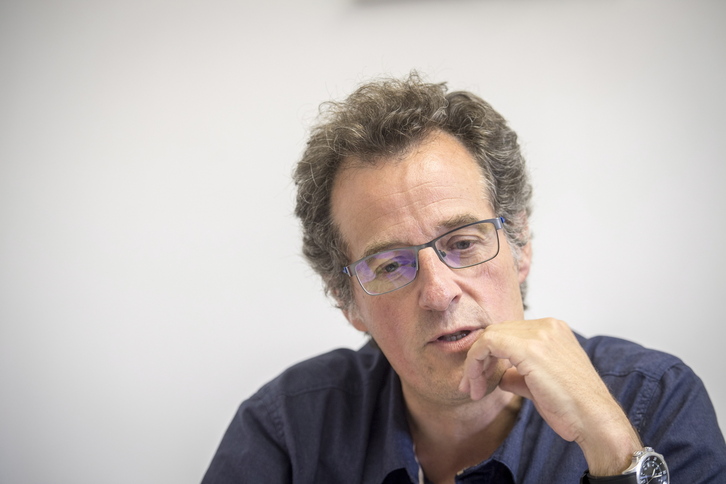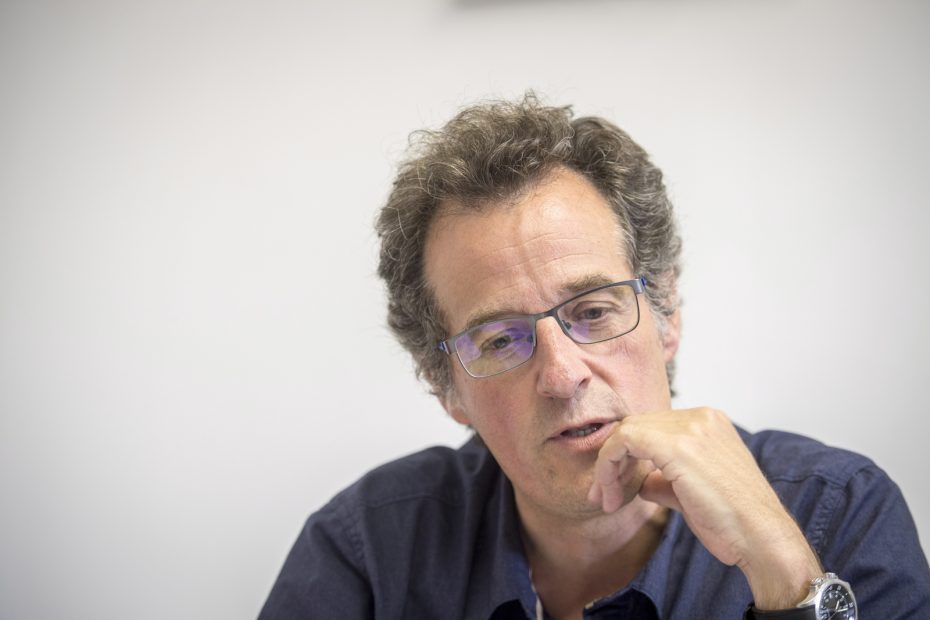
The day of reflection that will be held tomorrow in Gasteiz takes place in a particular context, when the debate on the Status once again gains strength.
Next week the anniversary of the Statute is celebrated, and basically the purpose of this initiative is to act as notaries of a diagnosis that is already old, of the idea that the process of erosion, degradation and emptying of the autonomy contained in The Statute is evident. It was already in the 90s. Obviously, this is not the Statute that could have been in 79, with the potential it could have had, and it is not an instrument that allows us to face the challenges that this part of the country has facing the 21st century.
The day also goes along those lines of overcoming the discussion about whether the need for a new Status is an identity debate or not. I believe that it is not an identity debate, although logically it is part of a reality that is the national fact, that Euskal Herria is a nation, but it is not an identity debate in that what is being debated is who decides what, in what territory and on what citizenship. It is a question of self-government and decision-making capacity.
New Status, new Statute… We are hearing everything.
It is important to establish the frameworks on which we work; It is not so much completing a Statute and from there expanding self-government, but rather reconceptualizing the relationship we have with the State. You cannot complete something that is itself emptied or eroded, the framework must be changed. The debate is not just terminological; The Statute does suppose a reconceptualization of self-government and the relationship with the State, the Statute would maintain the same logic in which one of the parties imposes a certain interpretation of self-government.
«The debate is not only terminological; “The Status does mean reconceptualizing self-government and the relationship with the State, and the Statute would maintain the logic in which one of the parties imposes a certain interpretation of self-government.”
The keys to a new model will also be addressed. Without giving spoilers and in general terms, what would they be?
In a certain way they are those contained in the basic agreement between the PNV and EH Bildu, with Podemos in many of those contents. There are three or four ideas that in a certain way feed this reconceptualization of our country’s relationship with the State. Firstly, national recognition with legal-political consequences. That is, not a merely rhetorical national recognition that has material consequences. And the first and main material consequence refers to the establishment of an effective bilateral relationship, which is defined as a Political Agreement.
It would be in some way the translation of the confederal philosophy of the Economic Agreement to the competencies not only socioeconomic or fiscal but of another type. That would mean a broader and more armored competence than now, while some competences would be defined as regional, and over these competences there would be absolute exclusivity of the new political subject. And there would be others under an agreed regime, competencies in which it would be convenient to establish common bases agreed with the State. But, in any case, they would be bases agreed upon with the State, breaking the scheme that has worked in recent years, in which the State has established increasingly expansive bases, thereby reducing autonomy.
This Political Concert then requires a management system, which would be the concrete, organic expression of that bilateral relationship. A Mixed Political Concert Commission in which areas of agreement would be established. And furthermore, an added conflict resolution system that breaks with the unilateralism that now exists when some type of jurisdictional conflict arises, some type of joint conflict management system.
And finally, the establishment of some formula that would guarantee the right of Basque citizens to establish the relationships they consider appropriate, first of all with other territories of the Basque Country, and also with the State, which is what is generically defined as right. to decide.
Several years have passed since that basic agreement. Do you see an option to resume it and reach an agreement between the Basque agents before going to Madrid?
The logical approach is to articulate the broadest alliances possible in the Basque area and then agree with the State on the self-government formula that is agreed upon by the majority here. I believe that the majority of Basque society is clearly expressing its demand for self-government, and it is the demand that was included in that basic agreement, which expresses a social majority, a union majority and a parliamentary majority.
They should go to Madrid with the support of the absolute majority of Parliament, and the statutory reform procedure would be followed in the first instance. The debate between Status and Statute has an underlying political significance, but in this case the approach would be one of statutory reform to reconceptualize the relationship with the State, establishing a new legal-political status. In this case, for this part of the country. The route would be that. I think it is quite clear, in the aspects related to self-government, where the majorities are in this country. It would be making what is already socially and politically effective institutionally effective.
If that stage is reached, then there remains that of Madrid and the position of strength of the State. We already know, for example, what happened to the Statute. Are there options to move that stone?
In the question of the Catalan Statute and the Ibarretxe proposal, in that historical phase, a true constitutional mutation occurred. The outright rejection of Ibarretxe’s proposal, the fact that the proposal was not negotiated, which was approved by an absolute majority of the Basque Parliament, and the ruling 31/2010 on the Statute, that the Constitutional Court laminated the most relevant issues, defined a way of relationship between the State and the autonomies that broke the scheme that was proposed in the Constitution of ’78. The ball is in the side of the Spanish State; whether it is going to assume the material reality of the State, a plurinational reality, or whether it is going to follow the path of recentralization that began in 80-81 and that has been increasingly degrading.
It is true that at this moment there is at least one Government and some political forces that are expressing, not yet too ambitiously but discursively, the assumption of a plurinational reality. The point is to take advantage of this situation to move forward. On the Basque side or the stateless nations, what we have to do is put forward sensible, reasonable, and rational proposals. And then, depending on the response, when those rivers arrive, we will have to build the bridges and cross those bridges, or not cross them, when the time comes.
«There is at this moment a Government and political forces that are expressing, in a way that is not yet too ambitious but discursively, the assumption of a plurinational reality. The point is to take advantage of this situation to move forward.”
This debate is linked to the democratic regeneration of the State. Now he spends a lot of time in Madrid, in the Senate. Do you see the powers of the State willing to regenerate themselves democratically?
It is difficult to see exactly what the democratic mood or temperature of the State is. On the other hand, it has become a cliché, but I think it is real, that when we talk about the State we are talking about what some define as the M30, or Madrid Federal District, which are very Madrid logics. When you visit the territories of the State you realize that many times the problem is Madrid and its political logic.
Also, in this global situation, there is the fact that the Spanish right is clear with which ideological model they are going to align with; If they are going to tune in with the Trumpist models of Milei, Bolsonaro, etc., which in the PP are personified by the FAES, Aznar and Ayuso, or if they are going to opt for more reasonable right-wing models that can understand what the national plurality of the State. That debate is surely also being held by the right, because I think they are aware that the governability of the State depends on a relatively peaceful situation with stateless nations. What the resolution of that debate will be on the right remains to be seen.
